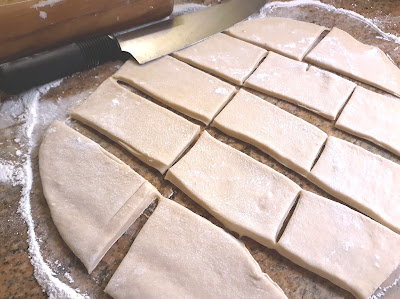Until well into my teens, I had no idea that the British had laid claim centuries before I was born, to the "scone", a dry biscuit pastry that had to be served with tea just to wash it down. How could this be, I wondered and assumed the English, from whom I am descended, were unfortunately mistaken but then when I considered that an entire British nation was confused, I confess, I had to question my assumptions about food origins.
In my search for the truth, I looked inwardly to examine my own culinary heritage, a tradition that included pioneers crossing the North American plains in covered wagons with yeast and flour preciously stored in cushioned barrels. My mother carried on the pioneer tradition and called these fried, golden yeast squares, "scones". As her mother had done before her, she taught me how to stretch the dough a bit just before cooking, to ensure the scones rose with a pillowy puff in their middles as they cooked.
In my imaginings, I could make it work; the pioneers' encounters with Native Americans were for the most part friendly....perhaps even included exchanges of culinary techniques and recipes? Regardless, stubbornly I continue to defend my heritage and proclaim scones to be thinly rolled yeast enriched dough, cut into squares or triangles and deep-fried until golden. Versatility allows them to be served with butter or if in the mood for a sweet version with honey, jam, or powdered sugar.
Often, my children's Sunday family dinners were scones and soup, the only variable being the kind of soup served (I confess to being a bit of a softy - preparing 2 - 3 different soups to satisfy 6 diverse clamoring appetites.) Scones partner equally well with chili, stews, bisques, as a side bread and alone as dessert with ice cream and toppings heaped on top.
And as to the British scone, we now have an amicable relationship and I have known a Brit or two to enjoy my scone version as well. I just call theirs "tea biscuits" and they can call mine "Indian Fry Bread", but only to themselves.
Scones:
2 tablespoons dry yeast
1/4 cup lukewarm water
2 cups warm water
1/3 cup sugar
2 tablespoons vegetable shortening
2 tablespoons soft butter
1 tablespoon salt
2 eggs
5 cups all-purpose flour, approximately
3-4 cups vegetable oil for frying
-Sprinkle yeast over 1/4 cup water in small bowl.
Set aside for 5 minutes. In large mixing bowl,
combine 2 cups water, sugar, shortening,
butter and salt. Mix with wire whip until smooth.
Stir in dissolved yeast and eggs. Mix well. Add
flour a cup at a time until dough pulls away from
the sides of the mixer or comes together in a ball if
mixing by hand. If mixture is too sticky add a bit
more flour 1/4 cup at a time, until you can handle
the dough. Knead for 5 minutes by hand or with
electric mixer with the dough hook.
-Place dough in a large oiled bowl and cover with
plastic wrap. Let sit in warm place or in the oven
on "bread proofing" setting for about 1 1/2 hours,
or dough may be refrigerated 8 hours or
overnight. (This longer process allows dough to
rise slowly.) If you refrigerate your dough, let it
sit out about an hour before rolling out to cut out
the scones.
-When ready to use, punch the dough down & roll
dough to 1/4 inch thickness on a floured surface.
Let dough rest 10 minutes then cut into 3-4 inch
squares or rectangles. Let dough rest another 30
minutes.
-Heat vegetable oil to about 375 degrees in deep
fryer or large, deep skillet or dutch oven. Place
dough squares carefully onto hot oil, pulling and
stretching dough slightly just before adding to the
oil. Scones should float while cooking and not rest
on the bottom of the pan.
-Cook until golden brown on first side and
scones puff up in the middle. (Sometimes the
squares do not puff....they are still delicious, so
serve them anyway.) Turn squares with tongs to
the other side and continue to cook until golden
(about 3-4 minutes total cooking time). Place on
paper towels. Serve warm or at room
temperature Makes about 3 dozen scones.
Shape dough into disc and roll on
well-floured surface
Cut dough into 3 -4 inch squares or
rectangles and let rest 30 minutes.
Place each square into hot oil and
fry until golden and puffy.
Serve warm scones with butter, honey,
and jam or as an accompaniment to
soups and stews.
PERSNICKETY NOTES:
**When rolling out the dough, be patient. It has a tendency to shrink
back to its previous shape. Roll it then walk way for a few minutes to
let it rest, then roll again and give it another rest. You will eventually
coax it out to the thickness you want it to be.
**This scone is also similar to the Mexican sopapilla and can be served
with Mexican food, dipped in salsa or sprinkled with cinnamon sugar
as a dessert.





No comments:
Post a Comment